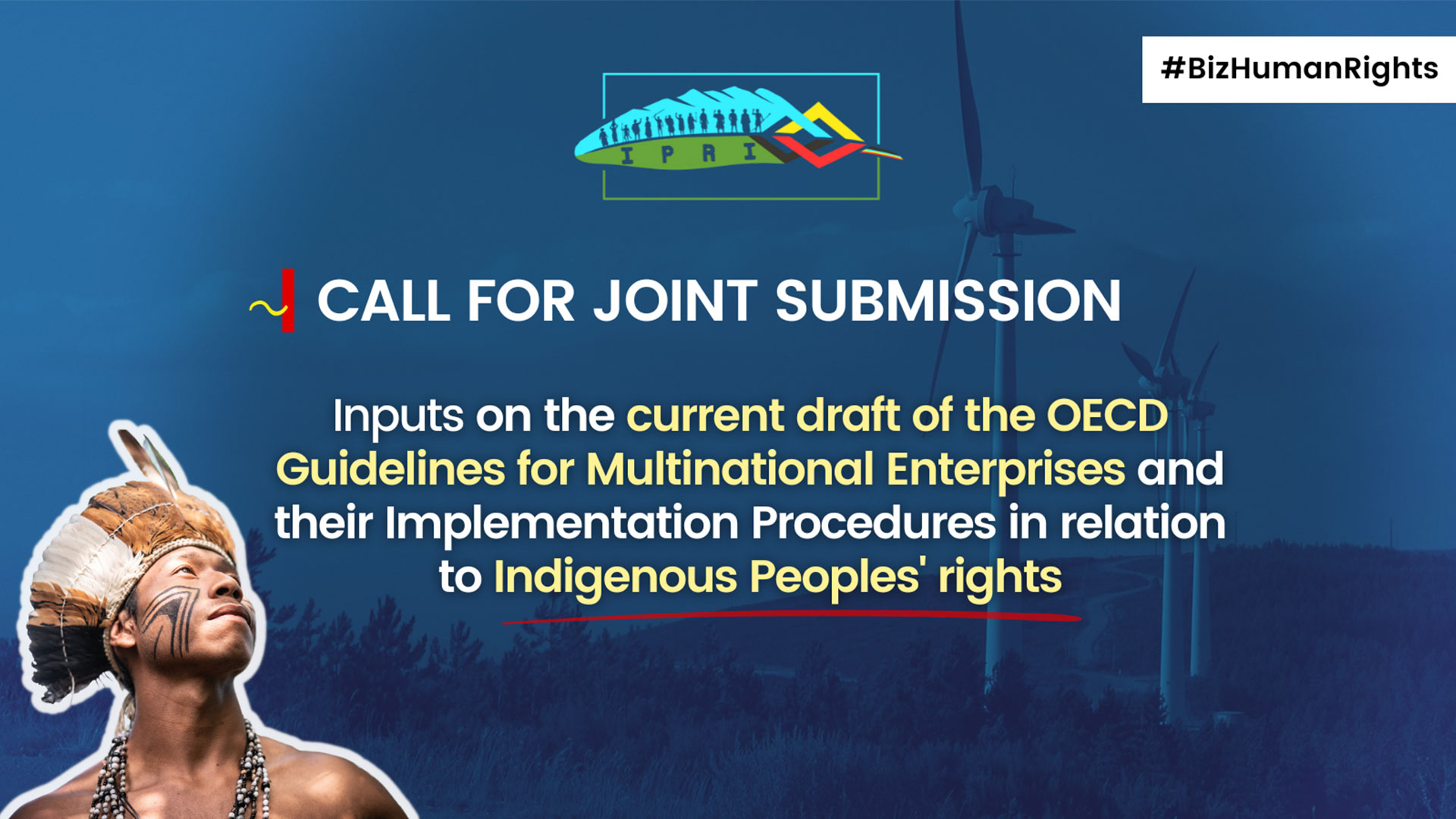
Dear friends,
Greetings of solidarity!
The Indigenous Peoples Rights International (IPRI) would like to draw your attention to the review process of the Guidelines for Multinational Enterprises under the Organization for Economic Cooperation and Development (OECD). As we – indigenous peoples have experienced serious violations to our rights and adverse impacts of multinational corporations’ projects and operations on our wellbeing, it is critical for us to raise our collective voice for meaningful consultations and inclusion of our collective rights in accordance with international human rights instruments and be accorded with effective grievance mechanisms. Some background information is provided below for your information and guidance.
In relation to this process, IPRI has prepared this joint submission reflecting our views on the weaknesses, limitations, and gaps of the current draft of the OECD Guidelines for Multinational Enterprises and their Implementation Procedures in relation to the recognition and protection of indigenous peoples’ rights in accordance with international human rights instruments; and our recommendations to address these gaps. We kindly request your indulgence to read this submission, along with the current draft of the OECD Guidelines and we hope you will also include the name of your organization/network to this submission as an agreement for us to collective raise our voice on this critical issue. Kindly click this link https://form.jotform.com/230301369079454 if you wish to include your organization to this submission on or before February 8. Please note that the deadline for submission of inputs to the draft Guideline is on February 10, so we kindly request that you to read this submission with this introduction as much as possible.
Thank you for your attention and we would sincerely appreciate your positive response. We shall keep you posted on developments related to this submission.
In solidarity,
Joan Carling
Global Director,
IPRI
Background
The Organization for Economic Cooperation and Development (OECD) is an international organization consisting of rich governments from 38 member countries[1] and 5 key partner countries[2]. These countries cover around 80% of global trade and investment and are home to most of the world’s multinational corporations, some of which have profoundly negative impacts on our rights.
The OECD has a set of Guidelines for Multinational Enterprises that address human rights, environmental and other issues related to business conduct. Each OECD member country has a National Contact Point (NCP) that can receive complaints about alleged breaches of the Guidelines by its corporations’ operations overseas and facilitate mediation with or make recommendations to those corporations.
The OECD Guidelines also serve as a reference point for governments when developing environmental or human rights due diligence legislation, and national courts sometimes refer to them as example of “good practice” when addressing cases taken by indigenous peoples. The Guidelines, therefore, can potentially be used in our advocacy strategies or in our pursuit of remedies for corporate human and environmental rights abuses including the violations to the collective rights of indigenous peoples.
The Guidelines were last revised in 2011 and do not mention the UN Declaration on the Rights of Indigenous Peoples or international and regional jurisprudence on our rights. They also lack guidance in relation to how to ensure respect for our rights and protect indigenous rights defenders. The OECD is currently in a process of updating the Guidelines and has sought input on some draft revised text. We are calling on it to consult directly with indigenous peoples as part of this revision process to ensure that the appropriate text on our rights is agreed with us and included in the revised Guidelines.
We are also requesting that steps are taken to engage with indigenous peoples an on-going basis following this update, with a view to ensuring that NCPs are properly empowered to facilitate adequate remedies when our rights are violated by multinationals of OECD countries.
------------------------------------------------------------------------------------
[1] Australia, Austria, Belgium, Canada, Chile, Colombia, Costa Rica, Czech Republic, Denmark, Estonia, Finland, France, Germany, Greece, Hungary, Iceland, Ireland, Israel, Italy, Japan, South Korea, Latvia, Lithuania, Luxembourg, Mexico, Netherlands, New Zealand, Norway, Poland, Portugal, Slovak Republic, Slovenia, Spain, Sweden, Switzerland, Turkey, United Kingdom and the United States.
[2] Brazil, China, India, Indonesia and South Africa. The European Union also has a permanent delegation to the OECD.

